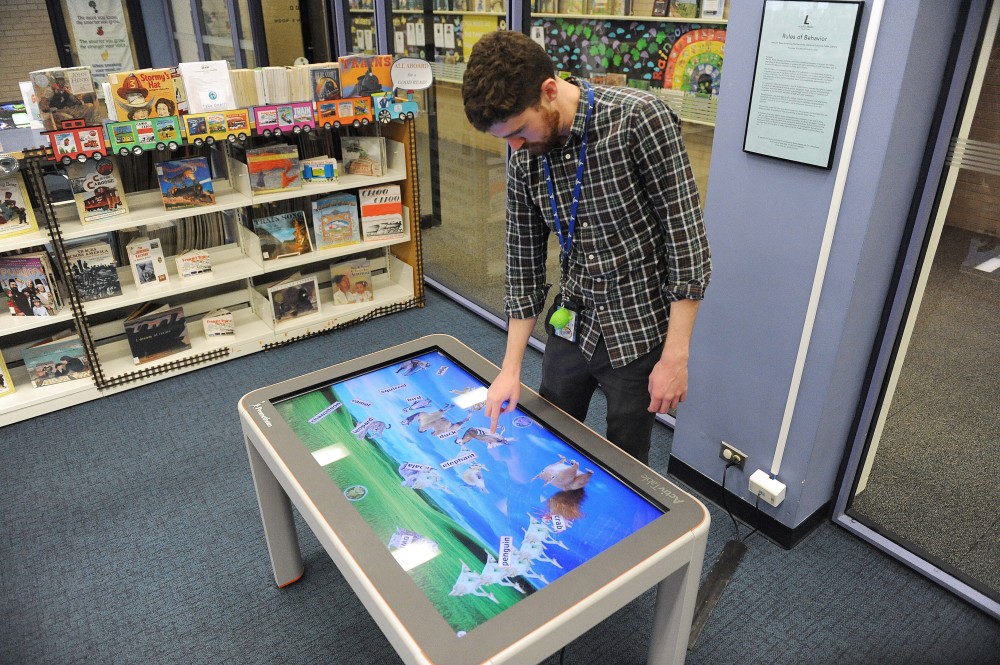By Maria Recio
McClatchy Washington Bureau.
WASHINGTON
The new public library on San Antonio’s south side is missing something that once seemed unthinkable: books.
The south central Texas city’s completely digital library, known as the BiblioTech, lets Bexar County readers check out up to five books at a time on their devices from home or wherever they are.
Military personnel can even download the latest bestseller from Afghanistan.
No device? No problem.
Locals can check out tablets or e-readers for free. Or they can use the library’s 48 iMac desktop computers.
Children can take home any of the 200 Nook readers pre-loaded with 150 books aimed at their age group.
Opened six months ago, BiblioTech is the nation’s first totally book-free public library.
It just added a satellite branch in the jury room of the Bexar County Courthouse. The name plays off the word “biblioteca”: Spanish for library.
In Washington, the downtown Martin Luther King Jr. Memorial Library cleared the stacks in one wing last June to open a vast, bookless “Digital Commons”, part computer lab, part design center and part reading lounge.
The bound book has held sway for 500 years, and doesn’t look like it’s going away anytime soon. But the digital age, which has crept into libraries through new technology, is slowly taking over.
A number of ambitious national and international digital efforts are underway, focused on making cultural heritage books, manuscripts and books available online.
The Digital Public Library of America and a Library of Congress-supported World Digital Library, which just reached 10,000 entries this past week, are making literary treasures, such as an early 16th-century Gospel manuscript from Ethiopia, more accessible.
“This project is of enormous benefit to students, teachers, scholars and lifelong learners,” Librarian of Congress James H. Billington said to mark the milestone, “and I am gratified to see that it continues to grow.”
At the MLK library, there’s a giant touch screen used for teaching classes and a 3-D printer that on a recent afternoon was in the process of building a small basket.
There’s also a new book printer machine that will print and bind a book, small work spaces for people who need places for start-ups, a sound studio and a touch-screen table in the children’s section for reading and playing.
There’s even a bank of express computers that visitors, no library card needed, can use for 15 minutes.
At North Carolina State University’s new James B. Hunt Jr. Library in Raleigh, the 1.5 million books are stored underground, leaving lots of space for research and study groups.
Virtual stacks enable students to check out books from a unique robotic retrieval system known as a bookBot that delivers them in five minutes or less.
“There are a lot of libraries that are shifting that way,” said Barbara Stripling, the president of the American Library Association. “One of the biggest worries of libraries is equitable access.”
The unlikely visionary in San Antonio was Nelson Wolff, the top county official, who in Texas is known as the county judge.
“It all started with my reading Walter Isaacson’s biography of Steve Jobs,” said Wolff, who’s in his 70s and was taken with the speed of technology developed by the late co-founder of Apple Inc. as he introduced a succession of new products.
So, in the space of about a year, Wolff raised the radical idea of a no-books library in a poor part of San Antonio with limited Internet service, used available space in a county-owned building and had it up and running by last September.
There were only 10,000 e-books at first. But the library has since added another 10,000 and hopes to bolster the collection with 10,000 e-books each month.
Wolff, a politician and former businessman who was the mayor of San Antonio in the 1990s, is a collector of first edition 20th-century books and has more than 1,500.
“I had refused to read e-books,” he said of the time before he began working on a digital library.
Now?
“I don’t read hardcover books,” Wolff said. “I buy them but I don’t read them.”
That kind of conversion may be spreading.
The BiblioTech attracts a steady flow of foreign and national visitors.
Several San Antonio library officials are traveling to the Netherlands and England in a few weeks at the invitation of foreign officials to make presentations about their operation.
But Wolff is pleased that the local, majority Latino community has access to reading materials and the Internet.
“The main thing is people are using it,” he said.
He’s especially tickled that the jury duty branch is taking off.
“It’s been a big hit with all the jurors sitting around,” he said.
County residents can sign on and download books on-site, and there’s been no problem with getting back the loaned e-readers and tablets.
“We’ve had a 100 percent return rate,” said Laura Jesse, Bexar County’s public information officer.
Downloaded e-books simply disappear from devices after two weeks. So no library late fees.
In downtown D.C., where the MLK library’s computers are the only access to the Internet for many, users come from all economic levels, including a lot of children and teenagers.
The latter enjoy the digital options, including gaming afternoons in a space for them on the second floor
“Teens are digitally native,” said library spokesman George Williams, adding that the libraries help break the digital divide.
Digital Commons Manager Nick Kerelchuk described the MLK library scene as “a culture of people connecting and sharing together.”














































































































































































































































































































































































